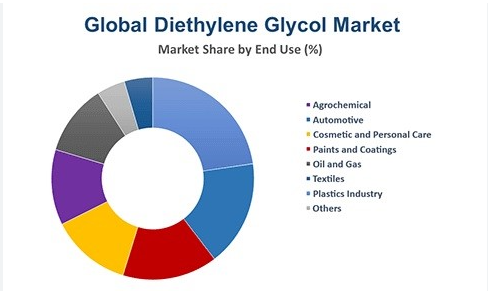Diethylene glycol (DEG) is a versatile compound widely used across various industries due to its
unique chemical properties and functional capabilities. Its applications range from pharmaceuticals to plastics, making it an integral component in numerous products and processes.
Overview of Industries Utilizing Diethylene Glycol
1. Pharmaceuticals: DEG serves as a solvent for active pharmaceutical ingredients (APIs) and plays a critical role in drug formulation. It aids in the solubilization of poorly soluble compounds, enhancing bioavailability.
2. Plastics and Polymers: In the plastics industry, diethylene glycol is utilized as a plasticizer, improving flexibility and durability in polymer products. It is also involved in producing polyesters and other synthetic fibers.
3. Cosmetics and Personal Care: As discussed earlier, DEG acts as a humectant and solvent in skincare products, enhancing moisture retention and product stability.
4. Textiles: DEG is employed in textile manufacturing processes as a dye carrier or solvent, facilitating the even distribution of dyes on fabrics.
5. Automotive Fluids: It is used in antifreeze formulations due to its low freezing point and high boiling point, providing effective thermal management for engines.
6. Food Industry: While not directly added to food products, DEG can be found in food processing applications where it acts as a solvent or carrier for flavorings and colorants.
Specific Examples of Products or Processes
- Pharmaceutical Formulations: Diethylene glycol is commonly used in cough syrups, elixirs, and topical ointments where it helps dissolve medicinal ingredients while maintaining product stability.
- Polyester Production: In the production of polyethylene terephthalate (PET), DEG contributes to polymer synthesis by acting as a co-monomer alongside terephthalic acid and ethylene glycol.
- Personal Care Products: Many moisturizers, lotions, shampoos, and conditioners contain diethylene glycol due to its ability to enhance moisture retention while improving texture.
- Dyes for Textiles: DEG functions effectively as a dye carrier in textile applications by helping disperse dyes evenly during the fabric dyeing process.
- Antifreeze Solutions: DEG-based antifreeze solutions are essential for preventing engine overheating during high-temperature operations while ensuring fluidity at low temperatures.
Discussion on Versatility of Diethylene Glycol
Diethylene glycol's versatility stems from its unique chemical structure that allows it to interact with various substances:
1. Solvent Properties: Its ability to dissolve polar and non-polar compounds makes it suitable for diverse formulations across multiple industries—from pharmaceuticals to cosmetics—where solubility is crucial.
2. Plasticizing Effect: In polymers, DEG improves mechanical properties such as flexibility without compromising strength or clarity, allowing manufacturers to create tailored materials suited for specific applications.
3. Moisture Retention Abilities: As highlighted previously, its hygroscopic nature enhances the performance of personal care products by retaining moisture effectively over time.
4. Compatibility with Other Ingredients: Diethylene glycol blends well with many solvents, surfactants, emulsifiers, and other additives used in industrial formulations; this compatibility fosters innovation when developing new products or optimizing existing ones.
5. Regulatory Compliance: With proper handling protocols established by regulatory agencies like the FDA (in pharmaceuticals) or REACH (in Europe), DEG’s application can be safely integrated into consumer goods without significant health concerns when used correctly.
In summary, diethylene glycol’s extensive range of applications across different industries highlights its importance as a multifunctional ingredient. Its roles as a solvent, plasticizer, humectant, and stabilizer make it indispensable not only for traditional uses but also for innovative developments within emerging markets—demonstrating that diethylene glycol remains pivotal in advancing technology across various sectors.
Applications in Industry
5
از ۵
8 مشارکت کننده